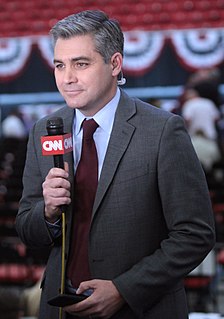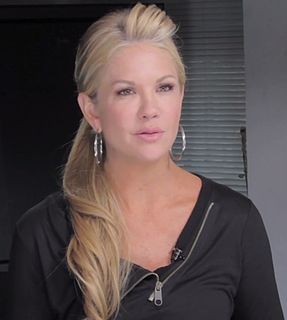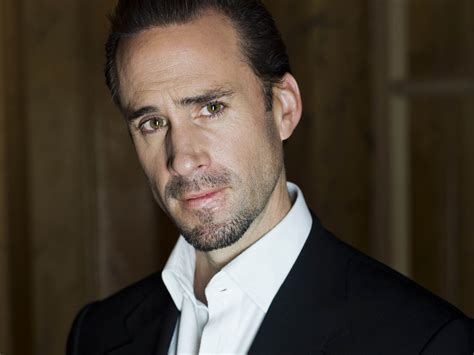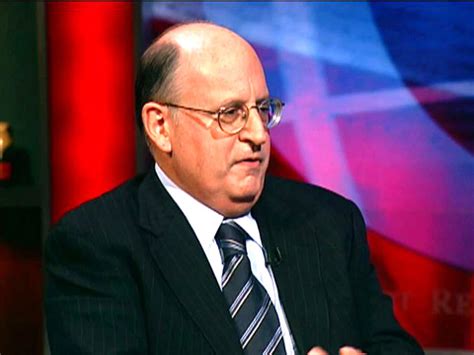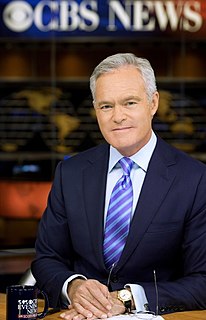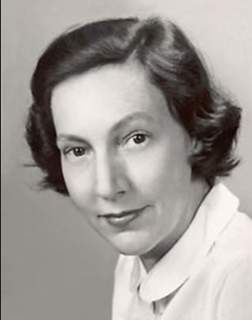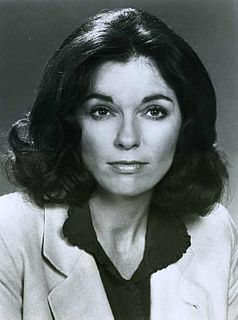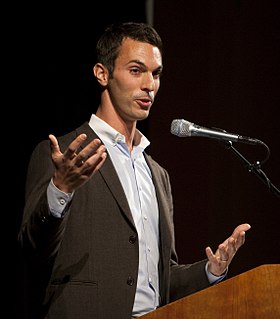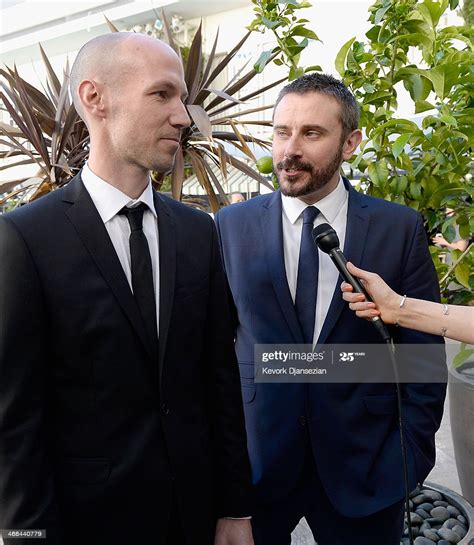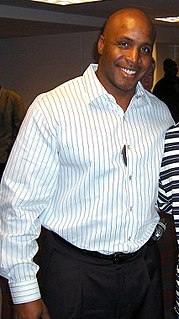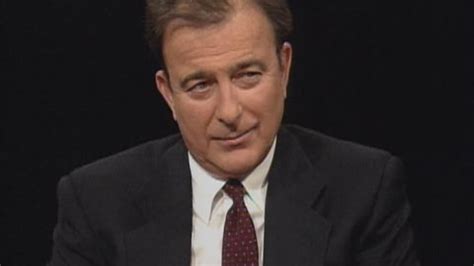Top 587 Reporter Quotes & Sayings - Page 10
Explore popular Reporter quotes.
Last updated on November 23, 2024.
It goes to show you how we in the press so often miss the big stories that are right under our noses. There is a famous journalistic legend about the time a young reporter covered the Johnstown flood of 1889. The kid wrote: God sat on a hillside overlooking Johnstown today and looked at the destruction He had wrought. His editor cabled back: Forget flood. Interview God.
My job as a reporter, my job as a senior White House correspondent for CNN, is to report the news, but also to highlight and put a microscope on episodes of presidential hypocrisy. And you know, if Donald Trump was going to come after us out on the campaign trail, and as president of the United States through his tweets, I think we are well within our rights to defend ourselves, and also provide that kind of critical coverage to the American people.
When all this is over, people will try to blame the Germans alone, and the Germans will try to blame the Nazis alone, and the Nazis will try to blame Hitler alone. They will make him bear the sins of the world. But it's not true. You suspected what was happening, and so did I. It was already too late over a year ago. I caused a reporter to lose his job because you told me to. He was deported. The day I did that I made my little contribution to civilization, the only one that matters.
I do a lot of work with the Red Cross, too. As a reporter, before I went to entertainment news, I tended to follow natural disasters. I went to Charleston, South Carolina, after Hurricane Hugo. I went to Miami the year after they were recovering from Hurricane Andrew. I came to California when they were recovering from a big earthquake. I've seen the Red Cross and how they stay there years after a natural disaster. They're not just there when a disaster is happening.
The truth is not that the problem is the newsroom does not understand capitalism. The problem is that the front office does not understand journalism. The problem is not that the average reporter does not understand what it is that's necessary to make the payroll, to make the good edifice, to make the thing that he wants. It is that in fact those who control too many of the edifices have actually come to believe that Wall Street has wisdom, and that that wisdom should instruct our business.
Donald Trump attacked the woman reporter writing the story, called her "disgusting," as he has called a number of women during his campaign. Donald thinks belittling women makes him bigger. He goes after their dignity, their self-worth, and I don't think there is a woman anywhere who doesn't know what that feels like. So we know what Donald thinks and what he says and how he acts toward women. That's who Donald is.
I think if the content is good and the content is interesting, the at home viewer will watch it for as long as the story is interesting thus the responsibility for making the story interesting falls on the shoulders of the reporter or the producer. Then I'm disappointed that producers have felt that television can only be told in 59 second story bursts because we've become, it's become journalism based on MTV, video electronic editing and cutting.
Donald Trump can't even handle the rough and tumble of a presidential campaign. He loses his cool at the slightest provocation. When he has gotten a tough question from a reporter, when he is challenged in a debate. When he sees a protester at a rally. Imagine, if you dare imagine, imagine him in the Oval Office facing a real crisis. A man you can bait with a tweet is not a man we can trust with nuclear weapons. And in the end, it comes down to what Donald Trump doesn't get, America is great because America is good.
The story he [Todd Willingham] told me was this: He woke up to a fire. He ran out of the house and couldn't run back in to save his children, and that was enough to get me interested. ... There's a writer in me that's like, ... this is a great story. ... I have a good friend, who was my neighbor at the time, and I told her about it. ... She had been a reporter, and she was like, "Let's go investigate it."
TV's Tony Snow becomes the White House press secretary. How will he make the difficult transition from Fox News reporter to Republican apologist? ... Mr. President, it is time to hire the folks who've never let you down. Limbaugh at Health and Human Services. Hannity at State. Then give Rummy the Medal of Freedom and install Bill O'Reilly as secretary of defense. Only problem, you might find yourself invading Vermont. And I'll replace Chertoff at Homeland Security. The man's done nothing to control the bear population.
In my day a reporter who took an assignment was wholly on his own until he got back to the office, and even then he was little molested until his copy was turned in at the desk; today he tends to become only a homunculus at the end of a telephone wire, and the reduction of his observations to prose is commonly farmed out to literary castrati who never leave the office, and hence never feel the wind of the world in their faces or see anything with their own eyes.
Why not just tell people I'm an alien from Mars. Tell them I eat live chickens and do a voodoo dance at midnight. They'll believe anything you say, because you're a reporter. But if I, Michael Jackson, were to say, 'I'm an alien from Mars and I eat live chickens and do a voodoo dance at midnight', people would say, 'Oh, man, that Michael Jackson is nuts. He's cracked up. You can't believe a damn word that comes out of his mouth.
I was very much against the Vietnam War, and Max Askeli was visiting Lyndon Johnson in the White House cheering him on, writing editorials. And in The Voice one day I once referred to him as Commander Askeli. And I called in to The Reporter to go over the galleys of a music piece I had written, and the editor whispered to me, `It's not gonna run. You're not gonna run. Max Askeli has fired you because of what you said about him.'
I was on television a couple of years ago and the reporter asked me, "How does it feel being on mainstream media? It's not often poets get on mainstream media." I said, "Well I think you're the dominant media, the dominant culture, but you're not the mainstream media. The mainstream media is still the high culture of intellectuals: writers, readers, editors, librarians, professors, artists, art critics, poets, novelists, and people who think. They are the mainstream culture, even though you may be the dominant culture."
I've had a lot of fun, and when I talk to kids in journalism schools, I say, look, I know what the journalism teachers tell you that this is a great way to perform public service and all that, but I say the main reason, if you decide what you want to do is be a reporter, the main reason you want to do it is because it's just so much fun.
A reporter asked me recently if the driving force behind me coming to Indianapolis was to hang out with my kid. I said to him, 'Nah, it's just sort of lagniappe.' He said, 'What?' I said, 'You don't know what lagniappe means? It's sort of like the extra scoop of ice cream on top of your sundae. It's like a bonus.' Lagniappe. Great word.
Perhaps the dumbest of these story lines is that [Pope] Francis has re-opened conversation and debate in a Church that had been closed and claustrophobic for 35 years under John Paul II and Benedict XVI. I defy anyone who, over the last 35 years, has spent time on the campuses of Notre Dame or Georgetown, or who has read the National Catholic Reporter, or who has gone to a meeting of the Leadership Conference of Women Religious, to make that claim without experiencing a twinge of conscience that says, "I should wash my mouth out with soap."
My work on prime gaps lead to lots of media coverage, some good, some bad, some ugly, and some merely ridiculous. For example, a reporter of our university newspaper, who admitted that he is still learning English, wrote that "Prof. Goldston solved one of the most controversial problems in the prime number theory last month with support from his Turkish partner."
We have entered a time when a writer's first idea is his best idea, when the first thing a reporter hears is the first thing that she reports. We live in a time now when we have seen major television networks take video off of YouTube and broadcast it to millions of Americans without verifying whether the video had been fabricated or not.
Well, the movie isn't bad. For a while, I even told myself I liked it, even as it missed one mark after another. But in the end, it's shapeless and blandly apolitical, apart from its watered-down feminism. You see, Fey's Kim Baker - changed from Barker - transforms herself from a neophyte reporter, condescended to by male war correspondents, soldiers and Afghan officials, into a hard-charging political animal who speaks the language fluently and parties as hard as men. That's about as edgy as a sitcom.
Being a reporter is one of the noblest things you can do in life. Letting the people know. It's really a holy cause. Time after time after time, in the middle of corruption and disgrace and bad politics, I've seen people come through and do for people. I write about someone in trouble and someone else rallies to help them. Through reporting, things can change.
Some of the qualities that go into making a good reporter - aggressiveness, a certain sneakiness, a secretive nature, nosiness, the ability to find out that which someone wants hidden, the inability to take 'no' with any sort of grace, a taste for gossip, rudeness, a fair disdain for what people will think of you and an occasional and calculated disregard for rules - are also qualities that go into making a very antisocial human being.
Mitt Romney's rally in Mansfield, Ohio, on Monday began the way every political event begins. 'Please stand for the Pledge of Allegiance and our country's national anthem.' This is always an uncomfortable moment for me. While I sat at my laptop, most of the reporters around me stood and put their hands over their hearts. This time instead of just sitting and working, I tweeted what I was feeling: 'Ari_Shapiro: As a reporter I'm torn about joining in the pledge of allegiance/national anthem at rallies. I'm a rally observer, not a participant.'
To say that we are closer to victory today is to believe in the face of the evidence, the optimists who have been wrong in the past. To say that we are mired in stalemate seems the only realistic, yet unsatisfactory, conclusion. It is increasingly clear to this reporter that the only rational way out then will be to negotiate, not as victors, but as an honorable people who lived up to their pledge to defend democracy, and did the best they could.
I think what drove me away from being a reporter was an inability to accept that the world came in neat stories. Every story you have to report is just part of something bigger. The news isn't what happened last night - it's some cumulative thing that's happened over centuries. I found it hard to think of one event and drag it out of a bubbling pot and present it as the story that explains it all.
Having said that, I`ve got to tell you, looking ahead, it`s like these storms coming in over the pacific that`s we feel in the press corps.Because you look at a campaign, which was a war on the media - that was at the heart of Donald Trump`s campaign, where if he banned certain outlets from coming to news conferences, every day he attacked the dishonest press, he pointed the finger, he called out reporter by name and attacked him.
The idea that a reporter has to be 'fair and balanced' is ridiculous. The fact is, the truth usually is not fair and it's not balanced. Truth stands by itself. And the idea that something called fair and balanced is a substitute for truth and fact is mindless nonsense that has captured much of the national media.
It's often frustrating when you're a war reporter and you're covering these places that far away. You're frustrated by making stories that people can't connect to in any way. It's hard for Americans to connect to Arabic-speaking Iraqis in refugee camps or Pashto-speaking Afghans in the countryside, and having a character who is a vehicle through which you're allowed to make these relationships really allowed us to gain in an emotional weight that was difficult for us to do any other way to make it all human.
As I walked down the street while talking on the phone, sophisticated New Yorkers gaped at the sight of someone actually moving around while making a phone call. Remember that in 1973, there weren't cordless telephones, let alone cellular phones. I made numerous calls, including one where I crossed the street while talking to a New York radio reporter - probably one of the more dangerous things I have ever done in my life.
For me, anything goes when I pick up a mike. I'm not trying to hurt people - I try not to get too personal - but I look at myself as a reporter. If you can report on anything that has to do with pop culture, then why can't I make jokes about it? Yes, it hurts. But I figure that laughter sometimes starts from pain. You might wince, but then I know that I'm doing my job. The only thing I can do wrong is not be funny.
My wife made me watch this documentary about the Iraq War, and there was a really powerful moment where they followed some civilian whose family had been killed. This was 5 or 10 minutes of this woman talking, and it was extremely arresting. You realize how you never hear from the person on the receiving end of a war without a reporter stepping in to compartmentalize the story. Usually they're just a few shots at the end of a news report, wailing and screaming at a funeral.
I discovered a long time ago that writing of the small things of the day, the trivial matters of the heart, the inconsequential but near things of this living, was the only kind of creative work which I could accomplish with any sincerity or grace. As a reporter, I was a flop, because I always came back laden not with facts about the case, but with a mind full of the little difficulties and amusements I had encountered in my travels.
Sidney Blumenthal is very close friend of Secretary [Hillary] Clinton. And her campaign manager, Patti Doyle, went to - during the campaign, her campaign against President [Barak] Obama, fought very hard. If you look at CNN this past week, Patti Solis Doyle was on Wolf Blitzer saying that this happened. Blumenthal sent McClatchy, highly respected reporter at McClatchy, to Kenya to find out about it.She failed to get the birth certificate.When I got involved, I didn't fail. I got him to give the birth certificate [of Barack Obama]. So I'm satisfied with it.
I've always argue against emotions. You're seeing intimidating threats against anchors by people in the Trump campaign. You see physical violence at rallies, you see a man handling of a reporter, Michelle Fields. You have Trump talking about opening this liberal law - these libel laws to protect feelings. What you're seeing here is kind of a mob mentality.
Donald Trump is the kind of guy that wants you to like him. He wants to be the centre of attention. A TV reporter is somebody who gives him a very grand stage, and I was the first national television correspondent following his campaign. So he wanted to charm me - and when he couldn't do that, he attacked. And it's the same thing he does every day with senators; he'll be charming with them and the next day he will go out and attack them on Twitter and if they don't fall in line. He toggles back and forth between these two aspects of his personality.
It is the soldier, not the reporter, who has given us freedom of the press. It is the soldier, not the poet, who has given us freedom of speech. It is the soldier, not the campus organizer, who has given us the freedom to demonstrate. It is the soldier, who salutes the flag, who serves beneath the flag, and whose coffin is draped by the flag, who allows the protester to burn the flag.
We're all so jaded. We've seen so many movies. We know what's going to happen in every single movie. I mean, there are some movies where I'm like why do I even need to keep watching? And so, if you can make a movie in which you're completely surprising the audience left and right, and left and right, then you've won. If a jaded film critic or reporter or an audience is like, "I didn't see that one coming," that to me is like a victory.
By this point, it was clear she wasn't interested in continuing the relationship. What publication on earth would continue a relationship with a writer who would refuse to discuss her work with her editors? What publication would continue to publish a writer who attacked it on TV? What publication would continue to publish a writer who lied about it - on TV and to a Washington Post reporter? ... It's true: Ann is fearless, in person and in her writing. But fearlessness isn't an excuse for crappy writing or crappier behavior.
And when I'd be reporting in Israel, Palestinians would say, the Jews they're not like us, and the Jews would say the same things about the Palestinians, they don't want what we want. And I never bought it as a reporter and I don't buy it as a novelist. I think, you know, the sound of somebody crying for their lost child sounds the same.
People don't live their lives in a series of scenes that form a dramatic narrative, they don't speak in dialogue, they're not lit by a cinematographer or scored by a composer. The properties of real life and the properties of drama have almost nothing to do with each other. The difference between writing about reporters and being a reporter is the same as the difference between drawing a building and building a building.
I produced a play in New York that got nominated for an Outer Critics Circle Award for Best American Play.The play is called Stalking The Bogeyman. It was a story on This American Life, and my former roommate is the artistic director of the New York Repertory Theater. He heard the NPR show, contacted them, and essentially - shortest synopsis ever, like I'm the Cablevision guide button - it's the true story of a man stalking and plotting to kill the man who raped him when he was seven. It's by a brilliant reporter named David Holthouse.
I'm no reporter. That's for the man with a suit and tie. I'm just relating to my people the best way I know, bringing them what they know and what they see out on the streets. I'm bringing it to them in a musical way, through a way of partying rather than violence. Now they can party their way through their problems.
I called all the major network news bureaus, including Public Radio, and reported ozone AIDS cures coming out of Europe. Not a single reporter or show called back for details. I wrote and sent documentation to all the 'household word' TV talk show hosts who make their living acting 'concerned' and I tried all the 'AIDS fund raising spokespeople', show business celebs, even sending proof of their home addresses, but as of yet not one single phone call or inquiry came back for more.
For years, more women were steered toward the studio or toward being a reporter. If that's what you want to do and that's what you love - by all means, go do it. That's OK to be ambitious and do things that are out of the norm if that's the route you want to take. We're already seeing women breaking down those barriers in what was once male-dominated. There are opportunities for women to fill those roles.
It used to be, if you were a reporter, you wrote a story and then you moved on to the next one. We were used to people coming to the New York Times. We waited for them to turn on our website or to pick up our print paper and see what we have. We now understand that we have to make our stories available to our readers. A lot of people get their news from Facebook or Twitter and we want to make sure that they see some of our best stories there, too. We do this more aggressively now than we did before.

